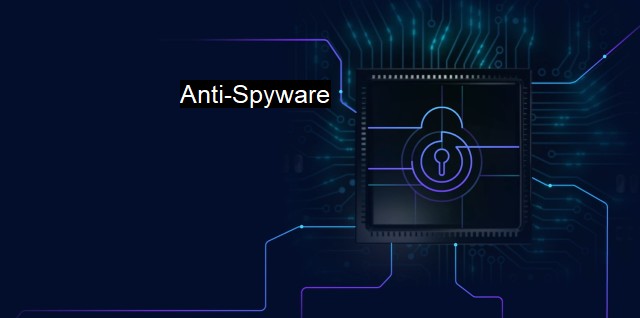What is Anti-Spyware?
The Ultimate Guide to Anti-Spyware Protection: Defending Your Personal Data from Stealthy Cyber-attacks
Anti-spyware refers to a specific kind of software application that is designed to detect, prevent, and remove spyware, a type of computer virus that hides within a computer system, collecting and sending sensitive information about the computer user such as their browsing history, usernames, passwords, and even financial data to a third party without the user's knowledge or consent.Anti-spyware plays a crucial role in securing computers and networks from potential threats, infiltrations, and unauthorized monitoring by cybercriminals who exploit spyware technology to execute cybercrimes such as identity theft, financial fraud, or blatant invasion of privacy.
Anti-spyware applications protect your computer and personal information from these intruders. Modern-day anti-spyware programs adopt various methods to locate and remove malicious software lurking within your system. Some of these methods include checking registry entries for changes, monitoring memory for strange behaviour, and comparing file signatures against known spyware examples to seek out and quarantine or permanently remove identified threats.
A robust anti-spyware approach commonly confirms whether software that appears to be spyware indeed possesses behavior that aligns with that of known spyware – this is accomplished via "spying" details like monitoring user browsing habits and relaying this information to others. Once an application is confirmed to be spyware, the anti-spyware program eradicates it and blocks future invasions from the same source.
Anti-spyware often works hand-in-hand with antivirus software in a combined endeavor to create a comprehensive shield against the full scope of cybersecurity threats, rangings from viruses to worms, and trojans to ransomware and malicious botnets. While these two differ --as antivirus software primarily wards off malicious software that can cause harm to the computer system, and anti-spyware focuses more on avoiding privacy breaches from spyware-- they work together to provide an optimized level of digital protection.
Even though they can function independently, they are most effective when used together; as combined applications in a single, cohesive cybersecurity solution, they can create multiple layers of defense for enhanced security. The overlap between the two becomes blurring, considering that some advanced antivirus software today include features that target spyware. Consequently, many cybersecurity solutions are multifaceted defense suites, offering protection from an assortment of online threats under the guise of both anti-spyware and antivirus.
The usage of anti-spyware tech is significant in modern times given the escalating rates of cybercrime and the continuously growing potential of covert surveillance strategies. Undoubtedly, its relevance will remain sturdy into the future as more individuals and businesses come to grips with the cyber threats landscape and the need to protect sensitive information from being compromised.
Importantly, aside from implementing anti-spyware software, it’s also crucial to foster safe and savvy online habits. An inclusive cybersecurity mindset involves being wary of unusual email attachments, steering clear of securing connections, and being watchful of what one downloads online. Sometimes, spyware is bundled and secretly installed on your computer along with other free software.........
Up-to-date anti-spyware tools, clever cybersecurity habits, continuous learning, and awareness are key elements in the war against spyware and the broader range of cyber threats that confront computer users daily. anti-spyware technology contributes enormously in establishing a more secure and dependable cyberspace where, even with the presence of threats, we can still safely and effectively harness today’s digital possibilities.

Anti-Spyware FAQs
What is anti-spyware software?
Anti-spyware software is a cybersecurity tool designed to detect, prevent, and remove spyware from a computer. Spyware is a type of malicious software that is used to collect sensitive information about a user's online activities without their consent. Anti-spyware software helps protect against identity theft and unauthorized access to personal information.How does anti-spyware software work?
Anti-spyware software works by scanning a computer's files and processes for any signs of spyware activity. It looks for patterns and behaviors that are consistent with spyware, such as monitoring keystrokes, capturing screenshots or recording audio. If spyware is detected, the anti-spyware software will either quarantine or delete the file. Some anti-spyware software also includes real-time protection that actively monitor a computer for spyware activity.Is anti-spyware software the same as antivirus software?
While there is some overlap between anti-spyware software and antivirus software, they are not the same thing. Antivirus software is designed to detect, prevent, and remove a range of malware threats, including viruses, worms, and trojans. Anti-spyware software, on the other hand, is specifically focused on detecting and removing spyware. Some antivirus software includes anti-spyware features, but not all anti-spyware software includes antivirus functionality.Do I need anti-spyware software if I already have antivirus software?
While antivirus software can help protect against a wide range of malware threats, it may not provide adequate protection against spyware. Spyware is designed to evade detection and can sometimes go undetected by antivirus software. Using anti-spyware software in conjunction with antivirus software can provide an extra layer of protection against spyware and other online threats. It's always a good idea to have both types of software installed and updated on your computer.Related Topics
Malware detection and removal Firewall protection Identity theft protection Virus scanning Ransomware prevention
| | A | | | B | | | C | | | D | | | E | | | F | | | G | | | H | | | I | | | J | | | K | | | L | | | M | |
| | N | | | O | | | P | | | Q | | | R | | | S | | | T | | | U | | | V | | | W | | | X | | | Y | | | Z | |
| | 1 | | | 2 | | | 3 | | | 4 | | | 7 | | | 8 | | |||||||